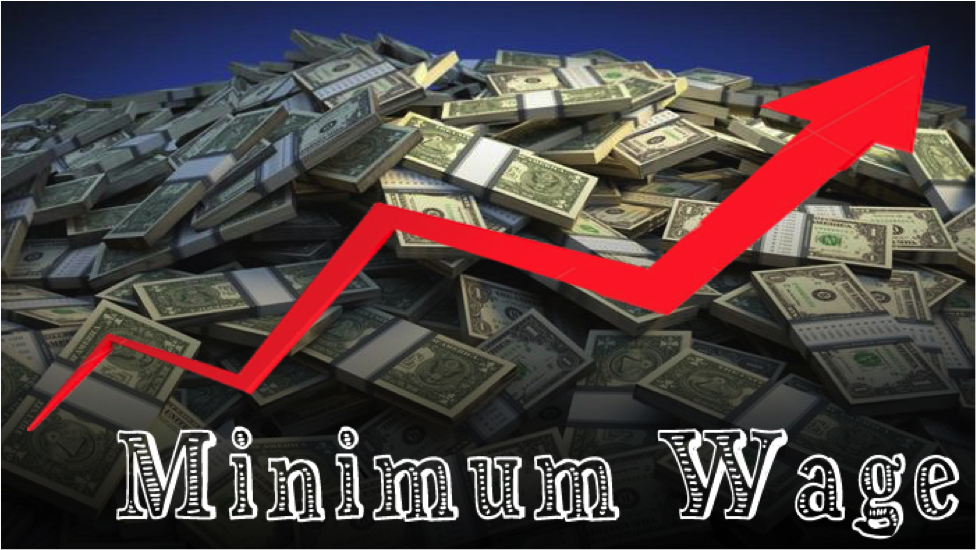
What to Do with the Minimum Wage: Pro Arguments (Part One)
October 23, 2016Archives . Authors . Blog News . Feature . Feature Img . Uncategorized ArticleBy Daniel Sperling
Is the minimum wage high enough today? Increasing the minimum wage could decrease poverty, benefit company productivity, and boost the economy. But is increasing the minimum wage really that simple?
In 1938, the United States Congress passed 29 U.S. Code § 201, otherwise known as the Fair Labor Standards Act (FLSA), which effectively shaped the history of United States labor law and regulation. The legislation introduced many characteristics of the work force that still exist today, including the minimum wage requirement.
The minimum wage is the base level that an employer can pay its employees as regulated on a federal and state/local government level. In 2007, the Fair Minimum Wage Act of 2007 was passed which gradually increased the federal minimum wage from $5.15 to $7.25 over two years. Currently, twenty-nine states have minimum wage legislation that ensures wages hirer than the federal standard, fourteen states have minimum wage legislation equivalent to the federal government, and five states have no minimum wage legislation. Two states, Wyoming in Georgia, have minimum wage laws that actually guarantee an amount less than the federal government, meaning that employees not covered under the FLSA are subject to the lower wage, which is $5.15 in both states.
As of 2014, about 3 million workers were paid wages at or below the federal minimum wage, making up 3.9% of all hourly paid workers in the entire workforce. The problem is that workers paid at the minimum wage level even at max working capacity are extremely close to the poverty line in this country. The poverty line is the official income determined by the Office of Management and Budget and used as a “criterion of eligibility in the community services block grant program.”
There have been large movements across the entire country to increase the minimum wage, such as the aptly named Fight for $15 movement. This organization wants the federal government to increase the federal minimum wage to $15 per hour, and is just one of the many organizations that supports such an increase. The Economic Policy Institute argued that an increase of the minimum wage to $12 would provide raises to 35 million workers directly and indirectly, would benefit the economy by pumping billions of dollars into earnings of workers who would spend the money on basic needs, and would be economically sustainable. Undeniably, a raise in the minimum wage would increase the standard of living for those minimum wage workers directly affected by the increase.
Many researchers tend to agree that increasing the minimum wage rate would lead to a decrease in poverty levels, which is obviously a change for the better in a country where the current poverty rate is nearly 13.5% of the country. Investopedia also cites a host of intangible benefits such as improved employee morale, which in turn could benefit productivity for companies and help them reach their production and financial goals, and could increase employee retention which in turn would reduce hiring costs and associated training costs. However, while many proponents of an increased minimum wage argue a host of benefits, there are also a myriad of counterarguments which assert that a minimum wage increase would have no effect or potentially a negative effect. These negative implications of a minimum wage increase will be discussed in the follow-up blog post, What to Do with the Minimum Wage: Counter Arguments (Part Two).
You may also like
- November 2024
- October 2024
- April 2024
- March 2024
- February 2024
- November 2023
- October 2023
- April 2023
- March 2023
- February 2023
- January 2023
- December 2022
- November 2022
- October 2022
- May 2022
- April 2022
- March 2022
- February 2022
- January 2022
- December 2021
- November 2021
- October 2021
- May 2021
- April 2021
- March 2021
- February 2021
- January 2021
- November 2020
- October 2020
- September 2020
- August 2020
- July 2020
- June 2020
- May 2020
- April 2020
- March 2020
- February 2020
- January 2020
- November 2019
- October 2019
- September 2019
- April 2019
- February 2019
- December 2018
- November 2018
- October 2018
- September 2018
- March 2018
- February 2018
- January 2018
- December 2017
- November 2017
- October 2017
- September 2017
- May 2017
- April 2017
- March 2017
- February 2017
- December 2016
- November 2016
- October 2016
- April 2016
- March 2016
- February 2016
- January 2016
- December 2015
- November 2015
- October 2015
- June 2015
- May 2015
- April 2015
- March 2015
- February 2015
- January 2015
- December 2014
- November 2014
- October 2014
- August 2014
- March 2014
- February 2014
- January 2014
- December 2013
- November 2013
- October 2013
- September 2013
- May 2013
- April 2013
- March 2013
- February 2013
- January 2013
- December 2012
- November 2012
- October 2012
- September 2012
- June 2012
- April 2012
- March 2012
- February 2012
- January 2012
- December 2011
- November 2011
- October 2011
- September 2011
- August 2011
- April 2011
- March 2011
- November 2010
- October 2010
- September 2010